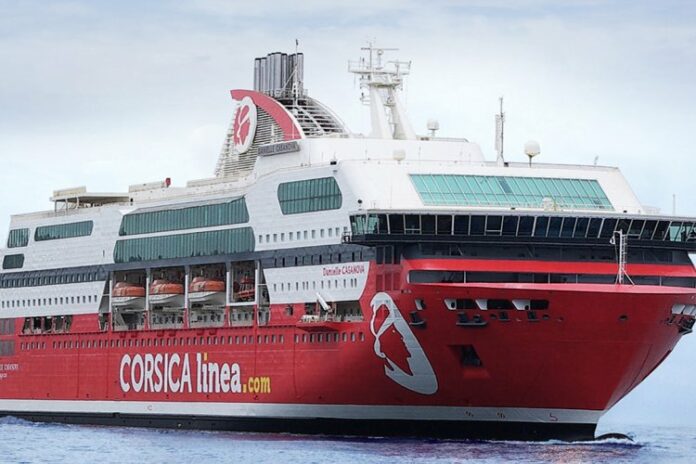The order includes power routing with EcoPilot and retrofit of governors, actuators and the pitch control system.
Danielle Casanova is the largest of Corsica Linea’s nine cruise ships that serves routes between the French continent, Corsica, Algeria and Tunisia. The vessel is currently at port in Marseille for maintenance and technical upgrades.
On Daneille Casanova, Corsica Linea has decided to install EcoPilot, a fully automated eco-driving system that uses weather forecasts and ship data to calculate the best power plan for a route and a set arrival time. It also implements continuous adjustments to maintain an even engine load and propeller pitch optimization for maximal fuel savings.
This type of automated eco-driving does not require the captain to manually change either speed or pitch. Instead, the active power routing provides the captain with full control over the arrival time and mitigates the human tendency to set a higher speed than necessary at the start of a voyage.
EcoPilot controls the ship’s propulsion system with instructions to the engine governor and the pitch control. Danielle Casanova will be equipped with new DEGO IV engine governors, new ASAC actuators and a new pitch control system. These will replace outdated technology and enable digital ship propulsion control and active power routing with EcoPilot.
The EcoPilot power routing system comes with a 3% fuel consumption reduction guarantee, but the expected savings for Daneille Casanova is in the interval of 6-8%, based on a somewhat conservative calculation based on installations on similar vessels.
The actual fuel reduction will be determined by a 4–5-week test period after commissioning. The fuel consumption during this period will be compared to a baseline from a reference period where the ship operates without EcoPilot. The comparison will be confirmed by a statistical analysis to compensate for any influence from varying environmental, load and speed conditions.
“EcoPilot achieves fuel savings through three main methods: firstly, it automatically executes optimized power plans, keeping the load on the engine constant. Secondly, it prevents instances of ‘hurry up and wait’ and thirdly by adapting quickly to changing conditions, ensuring vessels arrive just in time, thus avoiding unnecessary fuel consumption. According to Per Österberg, CCO at Qtagg, the impact of these methods on fuel savings varies depending on the length and frequency of voyages. For long ocean crossings, such as those undertaken by large tankers, optimized power plan execution has a significant impact. However, for shorter voyages, like the trip between Dover and Calais lasting 90 minutes, we’ve observed savings of up to 20%, equating to over 500,000 Euros per year for our customers. There’s a notable market interest in integrating EcoPilot into large retrofit projects for propulsion control systems. Additionally, there’s a growing trend in installing EcoPilot directly onto the bridge without the need for retrofitting, achieving a remarkable return on investment in just 3-4 months, as noted by Per Österberg. “Control over arrival times with predictable fuel savings is getting more and more important in the industry”, ends Per Österberg.
EcoPilot provides the captain with exact control over the arrival time, while saving fuel in a predictable manner. The expected fuel consumption for a voyage is automatically calculated beforehand, based on the desired arrival time, selected route and current weather forecast. In the voyage planning process, the captain will know how much fuel will be consumed to bring the ship to its destination.
“For us, this is not only about saving on fuel expenses. Installing EcoPilot will also help us achieve a reduction on CO2 emissions”, says Julien Colin, Superintendent at Corsica Linea SAS Division Technique. “As a company we have an ambitious plan to reduce our total CO2 emissions by 40% until 2030 and continue to move towards sustainable maritime transport in the Mediterranean It will be interesting to see how much a system such as EcoPilot can contribute towards our goals”.



